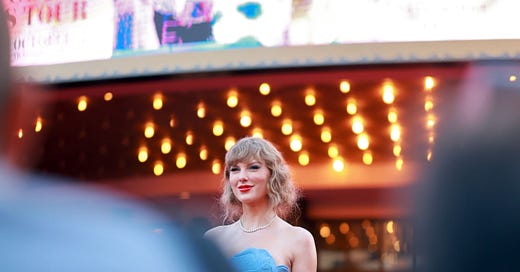
hilariously, clumsily, grossly visible

I think a lot of us grew up with the general understanding that feminist were bra-burners and man-haters. My mom didn’t believe this, and I don’t think I ever truly believed this so much as others joked and otherwise told me it was the case. At some point in high school, I saw the bumper sticker that said “Feminism is the radical idea that women are people” (this car was certainly not in my hometown in Northern Idaho, so who knows where it came from). I didn’t call myself a feminist because the kids in my school called feminists lesbians; I didn’t see any problem with being a lesbian but wow was I terrified of being different in any way.
That’s all prelude to the idea that hackneyed, lazy understandings of ideas are propagated by people who are scared of what they mean, and even more scared of threats to their own position of power. I think about this a lot with the word patriarchy, which, if you use it to describe a given culture or society, you automatically 1) hate men or 2) want to kill all men or 3) can’t find a man to have sex with you. (Obviously this is not the case in a lot of progressive, feminist conversations or spaces. But the spaces (family homes, workplaces, internet spaces) most of us occupy, even those of us who are feminists, are not always that way).
It’s difficult to explain that patriarchy means rule and control by men, power held by men, and the generalized idea that men are more valuable and important — and that that can be true even if some women have some power. All sorts of people, and not exclusively men, can be involved in its preservation; the vast majority of the time, they’re not aware they’re doing so. Institutions help sustain patriarchy, but so do individuals and traditions and clothing norms and religious beliefs and health insurance benefit plans and air conditioning standards.
Patriarchy is the fact that many (most!) women in the United States couldn’t open a bank account until the 1960 but it’s also the lack of allocated rooms for women to pump at work when they return from giving birth. It’s women as men’s legal property and the accepted wisdom that women are “just naturally better” at multi-tasking. It’s “wives submit” and all the dudes in the replies to my tweets trying to educate me on, well, everything, but especially in areas where I’ve spent years becoming an expert.
That’s the harder thing for most people to understand: that it’s the super fucking obvious stuff that no one would argue about and the more insidious practices whose status within the patriarchal framework is elided as just the way things are.
Those who benefit from patriarchy work to protect each other — often without really understanding or acknowledging why — and then attempt to deny that their gender, and the power that clings to it, has anything to do with it. And if you try to call it what it is — patriarchy! — they counter that you’re seeing conspiracy where it’s just business, it’s just tradition, it’s just following protocol, it’s just friendship.
Again: this is hard to describe! It sounds like a conspiracy theory! Which isn’t that off, really: people who don’t benefit from patriarchy often experience it as a feeling that nearly everything in your life is collaborating to make sure you stay in your current place, and people look at you weird when you try to connect the dots. (It’s worth noting that white supremacy and hetero/cisnormativity and neocolonialism all work the same, often in intersection with patriarchy, and if people get pissed off when you say that they’re part of the patriarchy, you know exactly how pissed off they’ll be when you also try to tell them they’re being a white supremacist hetero/cisnormative neocolonialist. Just because they don’t like it doesn’t mean it’s not true.)
But this week! If I were in the classroom, I’d move my curriculum around to teach ideology and patriarchy this week, because its intersections are so hilariously, clumsily, grossly visible. You might have noticed them, too; for me, it was every time I felt flames coming from the side of my head.
The First: Faux outrage over Elizabeth Warren’s differing explanations of getting let go from her job as a teacher after she became pregnant in the 1960s. I get it. No one wants people, especially political leaders, fudging the details of their past. The Daily Caller’s framing of the discrepancy, as well as subsequent reporting on it (almost entirely by men!) implied that because there was no documentation of Warren’s dismissal, or because she emphasized a different component of it during an interview in 2007, that her current account was a lie.
If you’re a woman who’s been pregnant, or just someone who’s had a lot of women who’ve been pregnant talk to you honestly, you know just how prevalent pregnancy discrimination remains. It’s not as simple as YOU PREGNANT, YOU FIRED, in part because that is (still only relatively recently!) against the law. But there’s a long history of visible pregnancy as obscene, and that idea clings to pregnant women still: just because they’re also “beautiful” and “amazing” and “strong” doesn’t mean that they’re also not considered incapable, and fragile, and inferior. It’s why so many capable, brilliant women I know have hidden their pregnancies for months with Spanx. It’s why lawyers — who know the law! — do the same: it’s so, so difficult to prove pregnancy discrimination. It’s never YOU PREGNANT, YOU FIRED. It’s “we’ve decided to go in another direction” and its countless variations.
The anger that I saw erupt over this story earlier this week had far, far less to do with Warren and everything to do with the denial and/or ignorance of just how common this experience is — and how equally common it is for women to come up with different narratives to explain it, either to themselves or in public forums, because what other choice do we have? You want to shout it from the rooftops, but you also have to decide, every day, how much rage you accommodate and still go about your day. That’s life under patriarchy.
The Second: More faux outrage over Alexandria Ocasio-Cortez spending $300 on a cut and color in Washington DC. “Self-declared socialist AOC splurges on high-dollar hairdo,” the Washington Times headline declared. Apart from the profound misunderstanding of socialism (which isn’t about being cheap; it’s about creating a sustainable economy that benefits everyone…which means paying hairdressers a living wage) this story demonstrates just how narrow the tightrope is for a woman in public. Be powerful, but don’t actually try and leverage that power, but also: be hot, but don’t spend money or time doing it. Blend in to the patriarchal status quo, but erase all signs of effort (including $$$) that makes that possible.
My friend and fellow writer Amanda Fortini put it this way: “Men have no idea how much money it costs to be a woman.” What goes unsaid here: a woman who’s not subject to endless, distracting critiques about their body and appearance. Of course AOC could get the same (tax-payer subsidized) $20 haircut at the capital as Mitch McConnell. She could forgo all styling. She could stop buying and wearing coats (a critique from last year). She could stop shaving her armpits and legs, stop wearing lipstick, stop buying skincare products. And she could then be savaged every time she appeared on national television. Women don’t have win-win scenarios. We just do our best with those that are lose-lose.
The Third: The first-hand account of how NBC killed Ronan Farrow and Rich McHugh’s reporting on Harvey Weinstein. The report is worth reading in full, but the summary is that male executives at NBC protecting Weinstein — out of personal relationships, sorta, but also because those executives knew that NBC had a Matt Lauer problem. Institutions protect men in power; those men act shitty for many reasons, including the fact that they know they will be insulated from the results. And they don’t have to have a contract, or have it in writing, to instinctually know (which is to say: know because hundreds of years of precedent tell them so) that this will be the case.
It’s just something that (white) men in this country understand: they will be protected. And they will be protected because the people who get to decide who does and does not get protected are, wait for it, also (white) men. Your side of the story will be believed. Your interests and financial livelihood will be preserved. The (eventual) take-down of Weinstein happened in spite of coordinated attempts, like the one on the part of NBC, to ensure it wouldn’t. #MeToo was a temporary disruption, as evidenced by the the backlash against it and the “cancellation” of people like Lauer, or Louie CK, or Charlie Rose. Power recognizes its vulnerabilities and prepares its future defenses against them. There’s the familiar tactics (What was she wearing? What was she drinking?) and the newer ones (Her story changed. She didn’t tell anyone at the time. Why didn’t she go to the police. She just wants attention) but they all serve the same function: delegitimizing any attempt to destabilize the patriarchal status quo.
What articles like McHugh’s do so effectively = make it clear that the people who talk about patriarchy and power are not conspiracy theorists. Ideologies are constantly erasing their own existence, in denying their ideologies at all. If a power structure is “just the way things are” then why should it change, or even be questioned?
The patriarchy is everywhere in America, it infuses every part of our daily lives. Same for white supremacy and hetero-cis-normativity and neo-colonialism. But to keep going, those who want to dismantle each of those ideologies have to pick and choose what we’ll refuse to shut up about. There’s a lot to yell about every week. But sometimes, like this week, pointing out the way these systems work is easier, and more teachable, than others.
The thing I try and tell myself every week: Just because people don’t want to hear it doesn’t mean it’s not true. And just because this work is relentless doesn’t mean it’s not worth it.
Things I Read and Loved/Found Compelling This Week:
“An example of what feels like a message from society to millennials in particular: We’re going to offer less and expect you to get more out of it.”
A very smart piece on “the writer as influencer”
“Just because I was queer didn’t mean that I was suddenly smart. The teens felt more like me: giddy, gay, and extremely online.”
This profile of Pewdiepie includes an incredibly useful description of "Inner” YouTube and its logic
The celebrity fetish for “niceness”
We interviewed Elizabeth Warren about Ballers, and only Ballers
This week’s just trust me
If you know someone who’d enjoy this sort of thing in their inbox once a week-ish, forward it their way. You can subscribe (and access it in blog-like, shareable form) here. You can follow me on Instagram (mostly dog and Montana photos) here and Twitter (mostly yelling) here. And if you have comments or want to suggest something for next week’s just trust me, just respond to this email.









